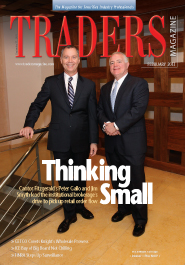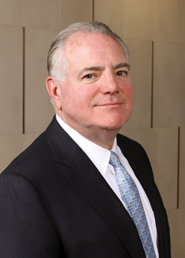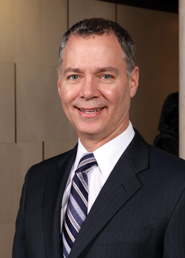You have to crawl before you can walk.
That’s the philosophy of trading industry veterans Jim Smyth and Peter Gallo, as they lead institutional brokerage Cantor Fitzgerald into wholesaling, the business of servicing retail brokers.

“This is not a business that happens overnight,” said Smyth, head of the newly formed equity broker-dealer group at Cantor. “Management made a strategic decision to build a retail broker-dealer execution business. It takes time for clients to trust you enough to have a direct connection to you. It’s a ‘show-me-proof’ business. You earn the next trade by doing the job on this trade.”
Cantor is a powerhouse when it comes to servicing buyside trading firms, employing a small army of sales traders in the major cities to take care of customers. But with the institutional equities business in a slump, Cantor, like several institutional brokerages, made a decision in 2011 to take its existing trading capabilities and begin to service retail broker-dealers.
Yet in wholesaling, where it will make matches for the brokers’ orders, it will contend with a formidable set of entrenched players, such as Knight Capital Group, Citadel Securities and Citigroup Global Markets.
Do they have what it takes? Cantor executives would not admit to possessing a “secret sauce,” but chief executive Shawn Matthews told Traders that “as a 68-year-old private partnership, we believe we have a significant competitive advantage, being well capitalized and not participating in high-frequency proprietary trading.”
Salesman and Techie
To get the job done, Matthews is relying on Smyth and Gallo.
See Sidebar: Another Way to Get Order Flow
Smyth spent nine years running the broker-dealer, or wholesaling, business at Knight, which reported $549.1 million in revenues in his final year with the unit.
He was recruited by Gallo, Cantor’s head of electronic trading and architect of the group’s new market-making system. Gallo joined Cantor in August 2011, after a lengthy technology career at Bear Stearns and in technology and sales in Citigroup’s wholesaling division.
In their current gig, Smyth is the salesman and Gallo is the techie.
“Cantor is looking to expand beyond institutional equities,” Gallo explained. “Management recognizes that you can’t focus on just one thing. You have to offer more.”
That’s an understatement. Until 2003, Cantor was best known as a stock brokerage for institutions. But, in the wake of 9/11, when Cantor lost 658 of its 960 New York employees in the World Trade Center attacks, the nearly 70-year-old firm has been hell-bent on expanding.
Cantor has moved into fixed income sales and trading, asset management, investment banking, market data, energy trading, high-yield debt sales and trading, emissions trading, bank loans, prime brokerage, sports betting, emerging markets trading, risk arbitrage, exchange-traded fund arbitrage, stock loans, clearing services and other businesses.
That’s not to say the firm hasn’t stumbled at times. In 2009, the scrappy trading house landed Ken Savio, formerly global head of trading and sales trading in Bear Stearns’ stock trading division, as global head of equities. That relationship lasted only a year and a half before Savio retreated to the comfort of another large bank, Macquarie Group.
In February 2011, Cantor hired Dan Segal from New York brokerage SEG Capital to launch its ETF arbitrage desk. Segal departed a year and a half later. (However, others hired around the same time to make markets in ETFs are still working at Cantor.)

Perhaps more significantly, Cantor’s expansion has made the rating agencies a little nervous. In October, Moody’s Investors Service downgraded Cantor’s debt to junk status, arguing that all the hiring has done little to boost profits. In December, Standard & Poor’s also knocked Cantor down a notch to BBB-, partly due to “management’s expansion strategy.” How Cantor is faring financially is not public, because it operates as a private limited partnership.
The Wholesaling Move
Although it’s an institutional broker, Cantor’s move into wholesaling is not unprecedented. With buyside trading volume down, several institutional firms have begun to chase the retail brokerage trade in recent years. Prominent among them have been Goldman Sachs, Credit Suisse, Cowen & Co. (which recently scrapped its initiative) and Investment Technology Group.
The wholesaling business is dominated by a group of five large broker-dealers that make markets in thousands of stocks. Knight is the largest and the oldest, having been formed in the late 1990s. The others are UBS, G1 Execution Services (formerly known as E*Trade Capital Markets), Citadel Securities and Citi/ATD.
Much of the industry’s retail order flow, which comes from hundreds of brokers nationwide, is effectively spoken for. Of the largest retail brokers, most have strong ties to a particular wholesaler, according to regulatory reports.
TD Ameritrade and Scottrade, for instance, have favored Citadel with most of their flow for years. E*Trade sends most of its flow to its G1 subsidiary. Charles Schwab & Co. has an agreement to send all of its flow to UBS. Morgan Stanley Smith Barney sends half of its flow to Citi/ATD. Only Merrill Lynch tends to avoid concentrating its flow with any one wholesaler for any length of time.
The execs at Cantor have no illusions about muscling in on the group of five in the short term. They say it will take years to move up in the rankings. And rather than confront the establishment head-on in breadwinner National Market System stocks, Cantor has started out humbly processing orders from brokers in over-the-counter stocks.
The market in OTC names is less concentrated. While Knight, Citi and G1 split 60 percent of the volume there, according to data from OTC Markets Group, most of the rest is fought over by about a dozen firms. Cantor is part of a pack that includes Vandham Securities, Vertical Trading Group, Citadel, UBS, Maxim Group, Pershing and others. Among OTC dealers, Cantor was ranked 16th by share volume on a recent day in January, trading about 13 million shares, according to OTC Markets.
“We’ve started on the OTC side,” Smyth said, “but we are a hybrid market maker providing full execution services in both NMS and OTC names. Some clients have told us they have greater needs on the OTC side, while others say their needs are more executing NMS.”
Smyth has spent more than 35 years working in the securities industry, including 25 years at Merrill Lynch. It was at Merrill where he first made his mark in the broker-dealer business. Smyth was a managing director responsible for sales and marketing of the firm’s broker-dealer clearing operation, and spent his last five years as president of Merrill’s clearing subsidiary Broadcort Capital Corp.
Smyth joined Knight in 2002. Around 2004, Knight chief executive Tom Joyce charged him with bringing the firm’s market-making operation into the electronic age. At that time, Knight-like most shops-employed armies of traders to handle the flow. Order handling was done by computers, but actual fills were still largely manual.
That was all about to change thanks to ATD, the Mount Pleasant, S.C., company first known as Automated Trading Desk. The little-known electronic market maker was changing the wholesaling game by offering retail brokers fast fills at great prices using computers. Despite a customer base that totaled 750 broker-dealers, Knight needed to catch up or risk obsolescence.
Smyth helped transform Knight’s trading desk into a hybrid operation where machines handled the easy orders, and human traders took care of the oversize and more demanding ones. “The business was changing,” he said. “You had to reinvent yourself.”

By the middle of 2010, his job largely complete, Smyth was transferred to Knight’s fixed-income division in Greenwich, Conn., to oversee that newly acquired operation. He spent nine months there before deciding it was not his cup of tea. Smyth left Knight in October 2011 and joined Cantor in February.
Right about the time Smyth was pondering his exit from Knight, Gallo was pitching the idea of an automated market-making desk to Jarred Kessler, Cantor’s new global head of equities. Gallo had helped build models for retail order flow at Bear Stearns, where he spent 10 years.
“I’m very familiar with retail order flow,” he said. “So it was very easy for me to introduce that concept to Cantor management.”
Gallo began his Wall Street career working for Nasdaq from 1992 to 1996, on the technology side. After that, he co-founded a software vendor called Tools of the Trade, based in Jersey City, N.J. Tools sold a trading system hugely popular with Nasdaq market makers at the time.
In 1998, Gallo went to Bear, where his job involved liaising between traders and technologists. He was instrumental in building one of the first ECNs, the Strike ECN-owned by Bear-as well as dealing with the transformation of trading caused by decimalization and Regulation NMS.
Following the collapse of Bear Stearns in 2008, Gallo landed at Citigroup, where he spent the next three years. At Citi, technology acquired from its purchase of ATD and execution management system creator Lava Trading form the heart of the big bank’s broker-dealer business. Gallo split his time there working on technology for Lava and sales for ATD.
Human (and Machine) Approach
At Cantor, it took Gallo less than a year to build its trading system. The firm started doing trades earlier this year and has been publishing its execution-quality statistics since February. These monthly reports are mandatory under Securities and Exchange Commission Rule 605.
Smyth joined the firm that same month and has been busy assembling a crew of traders and sales people to construct a “hybrid” model similar to that which he built at Knight. The machine does the easy trades and humans handle the bigger orders. Humans are especially valued in the OTC market, which is not as automated as the NMS market.
“Our goal from the start was to build a hybrid trading model for both NMS and OTC securities, leveraging human and electronic capabilities,” Smyth said. “We’ve both added clients and grown market share.”

At the end of last year, staffing at Cantor’s broker-dealer group had reached 15. All but two were recruited from outside. Traders have joined from Citigroup and Merrill, among other shops, Smyth says. Most have at least 10 years of experience. Steven Krieg was an early hire on the sales side, having joined Cantor in January 2012. Krieg spent 15 years at Merrill Lynch.
Cantor is not alone in staffing up on the OTC side, however. Citadel, which entered over-the-counter market making on a purely automated basis in October 2010, hired a slew of traders from Knight and G1 to staff its OTC operations last fall.
Despite Cantor’s reputation as an agency brokerage, the firm does commit capital towards institutional trades when necessary. So moving into the wholesaling business-which demands capital commitment-does not represent a cultural change for the firm. “As a market maker, you obviously need to make a two-sided market,” Smyth points out. “From a risk standpoint, this is not a change for Cantor.”
The risks associated with market making became all too clear last Aug. 1, when Knight nearly extinguished itself at the outset of trading at the New York Stock Exchange. The disaster, which involved flooding the market with erroneous orders, caused concern among retail brokers sending their flow to wholesalers and brought the issue of a broker’s capital adequacy to the surface once again. Knight lost in excess of $450 million in not even 45 minutes of trading.
Some of Knight’s customers abandoned the big wholesaler, at least in the short term, sending their flow elsewhere. E*Trade, for instance, reported in a regulatory filing that its market-making unit saw its revenues increase during last year’s third quarter due to “disruptions amongst peers.”
Scottrade, which was part of the group of investors that rode to Knight’s rescue, was one of those moving some of its flow to E*Trade during the third quarter. “We keep an eye on all of our wholesalers,” Scottrade director of trading Matt Billings told Traders. “You have to make sure they are well capitalized.”
Alternative Opportunity
Smyth says the issue of capital has been front and center for many of Cantor’s prospective clients. Before many firms would even consider trading with the firm, they wanted to meet with Cantor’s risk and credit staffers. “After recent events, it matters,” Smyth said, noting that Cantor’s $250 million in regulatory capital and $17 billion balance sheet make it a sturdy counterparty.
Retail brokers that Traders Magazine spoke with all commend Cantor for entering the field. All said they like having alternatives to the incumbents, as well as backups when problems arise.
“We are really advocates of competition,” Scottrade’s Billings said. “If someone wants to enter this business and challenge the incumbents and push them, that’s all for the good. At the end of the day, the winner is the retail customer.”
Still, Billings believes newcomers need to differentiate themselves. “They need to find a way to differentiate themselves that captures our attention-in ways that improve the execution experience.”
Paul Jiganti, managing director of market structure and routing strategy at TD Ameritrade, also likes to see new competitors enter the business. “I encourage new players,” he said. “It keeps everybody honest. Plus, you can lose players. You must be cognizant of the fact that these players unfortunately do have hiccups, or blowups or takeovers.”
About 50 clients trade with Cantor on a daily basis, Smyth says. “I am excited about our progress to date and where we are going,” he said. “We continue to add new clients and gain market share, even in this low-volume and low-volatility environment.”




